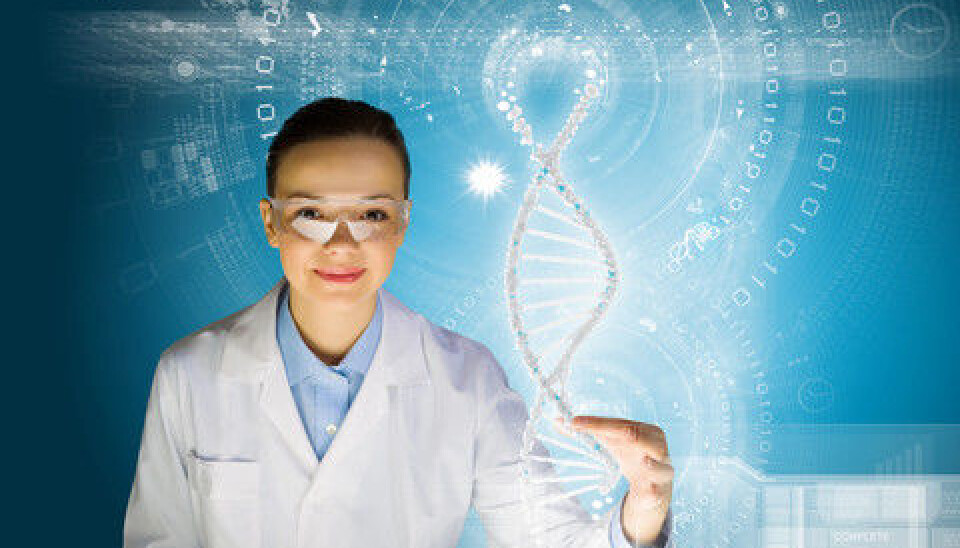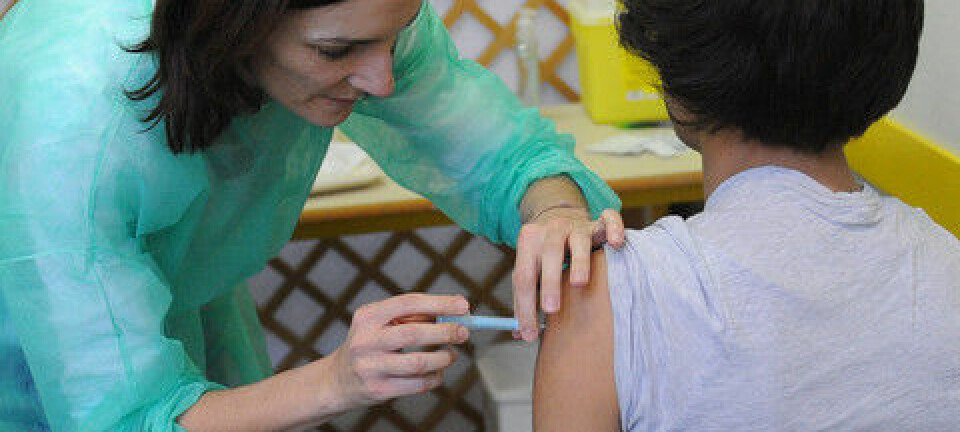
What are the major challenges to modern medicine?
Modern technology has revolutionised health sciences and people are living longer than ever. At the same time, more and more are becoming seriously ill.
We live longer, our DNA can be mapped and researchers can predict our risk of getting ill, new drugs are being developed all the time, we know that it's a good idea to exercise and eat greens.
You’d think things would be pretty well with the wonders of modern medicine but nevertheless a growing number of Europeans develop cancer, dementia, heart problems, and diabetes.
One of the most important tasks of science is preventing and understanding why so many people become ill, and scientists are currently debating how best to use technological advances and new knowledge to ensure the best public health.
Illnesses can be analysed at cell level
ScienceNordic asked a number of Danish researchers to give us an idea of the current trends and challenges in European health research. They told us how far researchers have come in understanding ageing, obesity, and resistance to antibiotics.
“We are going through a paradigm shift in our understanding of diseases,” said Professor Liselotte Højgaard, head of the Department of Clinical Physiology, Nuclear Medicine & PET at Copenhagen University Hospital. “As we find more and more biomarkers, and get technology to sequence more and more DNA details, we’re really starting to understand that the health of some people is more susceptible than that of others.”
The fact, she added, that we can analyse how illnesses develop down to a cellular level is a revolution.
“The technology and our new understanding that diseases develop differently in different people opens up for a long series of possible ways of treating and preventing illnesses,” she said.
Personalised medicine is the future
Højgaard recently organised a seminar about personalised medicine, which is a course of treatment adapted to the individual patient's genetic composition, epigenetics, life history, age, gender, and other factors that can influence how the patient's health develops.
Individualised treatments are today's big trend -- more and more research shows that some people may need another type of therapy than other people because they have certain genes, or that people with special biomarkers can run a higher risk of developing certain diseases, said Højgaard.
“Before long I think we’ll all have our clinical record and genetic sequence on a USB key,” she said. “Then if you’re admitted to a hospital the USB key will be read by a machine and the doctor can see your genetic composition, case record, and personal information.”
“This way, the doctor can immediately target the treatment to the individual patient, based on the information on the USB key about genetic factors, epigenetics, social circumstances, lifestyle, age, family history and so on,” said Højgaard. “In principle we could do it today.”
Longer lifespan equals more people with dementia
Technology, new knowledge, and more ways of treating people have already meant that doctors can keep us alive longer than ever before. But a longer lifespan is not synonymous with better health. As we live longer, an increasing number of us end our lives suffering from severe dementia or become so ill that we cannot look after ourselves.
In future, age-related diseases will have rising human and societal costs, said Lene Juel Rasmussen, a professor of cellular and molecular medicine.
“Many elderly people will suffer from cancer and various metabolic diseases such as type 2 diabetes because they are overweight, but our greatest challenge will be dementia diseases that we still cannot treat or prevent,” said Rasmussen, who heads the Centre for Healthy Aging at the University of Copenhagen.
“We’ve come a long way with stem cell therapies and we can now replace diseased brain tissue with healthy tissue,” she said.
Furthermore, researchers have recently started looking at how social relationships and lifestyle can influence whether people develop dementia
“But there is still a great deal that we don't know about the many different types of dementia that exist,” said Rasmussen.
Ageing is still mystery
Dementia is a blanket term covering diseases where the brain loses its functions. As well as Alzheimer's and Parkinson's diseases there are many other illnesses and some are yet to be classified. While researchers are becoming better at preventing, treating or relieving diseases such as cancer, type 2 diabetes and heart ailments, they still know very little about diseases that affect the brain's functions.
“There's a simple reason why researching dementia and developing therapies is difficult,” said Rasmussen. “You can't just take a sample of the brain out of a patient and carry out tests, like you can if it is the intestines or the blood that is ill. We can scan the brain, but that only tells us something about the brain's structure. To develop therapies against dementia means we must know something about how brain cells behave, and that requires fresh brain tissue to work with – and that is very difficult to get from human brains.”
In fact, researchers know very little in general terms about what happens in our cells when we age, said Rasmussen. In the future, one of the most important tasks of the health sciences will be unravelling the secrets of how and why the body ages, she said.
“Quite some time will pass before we understand the molecular and cellular ageing process,” said Rasmussen. “We know that the ends of chromosomes, called telomeres, shorten as we grow older. We also know that the biological processes in some cells become a little weaker -- but we don't know precisely what happens and why. There are really very many unknowns.”
The obesity epidemic is still a great threat
Obesity remains one of the really big risk factors in connection with the lifestyle diseases that often hit people who are getting old, said professor Thorkild Sørensen who works with metabolic and clinical epidemiology at the University of Copenhagen and head of the Institute of Preventive Medicine at Frederiksberg Hospital.
According to him, there’s still a great deal that researchers do not quite understand about why too much fat is stored in the bodies of many people.
“We know much less about obesity than you would think, and the obesity epidemic is a large global challenge, not least in developing countries,” he said. “There is no doubt that it is still a threat to world public health, because obesity increases the risk of getting a large number of diseases.”
Looked at in general terms, the development of obesity cannot be explained solely by how much you eat and how much exercise you get, said the professor.
“We know that some people can stand eating more than other people, but we still know very little about why some people store too much fat in their tissue while others burn it,” he said. “It’s difficult to determine that because very few calories end up in the fatty tissue every day.”
Maybe epigenetics makes us fat
Perhaps the answer to the obesity mystery will be found in epigenetics, which is the study of changes in the DNA caused by environmental factors such as pollution, stress, and diet. It has been shown that babies weighing too little at birth because their mothers did not eat enough while they were pregnant run a greater risk of becoming fat and developing type 2 diabetes later in life -- possibly because some of their genes are no longer active.
“The research field that looks at how genes work and interact with environmental effects is very large,” said Sørensen. “Perhaps we should look backwards to before the foetus was formed. There could have been epigenetic changes in the DNA in one generation that are transmitted to the next generation.”
In line with the theories behind individualised therapies, the professor believes that the development of obesity should be looked at in a holistic way where the individual's social and psychological factors are considered together with the brain's function and the role of the genes.
“In itself it’s quite natural and not dangerous for cells to store fat but in some people the fat gathers in too large quantities and damages the cells and the rest of the body because fatty acids that are not burnt quickly or stored are harmful,” said Sørensen. “This could be a matter of the brain's ability to send signals to the fat cells about how much they should store to survive. In some people that brain function may not work as it should.”
Resistance to antibiotics is spreading globally
One thing is taking up the minds of many doctors around the world these days and it is one of the largest current threats to world public health: resistance to antibiotics.
Multi-resistant bacteria will continue to spread very quickly throughout the world, said Dr. Henrik C. Wegener, provost at the Technical University of Denmark.
This is very serious, he added. If antibiotics can no longer kill bacteria then simple infections such as inflammation of the bladder can be lethal and surgeons cannot carry out larger operations.
“Resistance to antibiotics is a problem that arose just after antibiotics were discovered -- bacteria are very smart and can give off and absorb genes so they build up resistance to anti-microbiotic substances,” said Wegener.
“Finding new antibacterial substances in nature went well in the beginning and that made it possible to develop new types of antibiotics when bacteria became resistant to the old types,” he said. “But we've lost that race because we haven't found new antibacterial substances since the 1980s and there’s probably very little chance of finding some again for the time being.”
Antibiotics use is too high
Resistance to antibiotics is spreading quickly across the world – in particular because we travel more, have surgery abroad, and in the worst case by carrying multi-resistant bacteria with us when crossing borders between countries. The more antibiotics we use, the faster bacteria develop resistance -- and we use a lot in agriculture, in hospitals, and in our homes.
“We can postpone the agony by behaving sensibly and reducing our consumption of antibiotics, but it's a tough fight,” said Wegener. “In Europe we have a quite stringent policy for antibiotics but authorities are far more liberal in large parts of the world -- in many places you can even buy antibiotics over the counter without a prescription.”
Around the world, researchers are trying to find alternatives to antibiotics but Wegener is sceptical when asked about the chances of success.
“I don't want to be too pessimistic, but nor is there any reason to be a rejoicing optimist,” he said. “The problem is that our backs aren't so hard against the wall that the pharmaceutical industry wants to invest millions in developing alternatives.
Translated by: Michael de Laine











